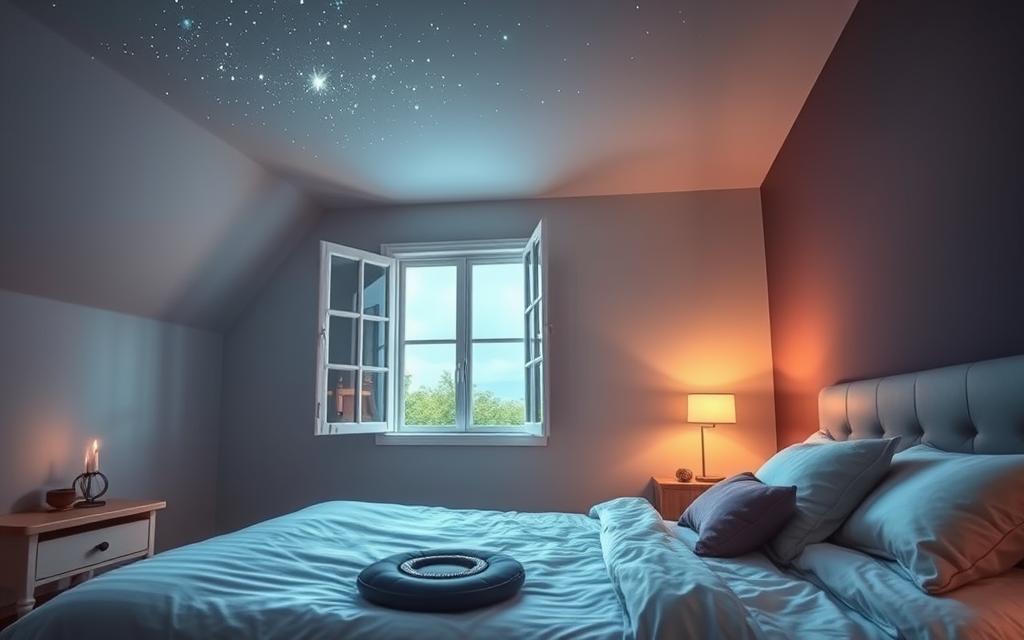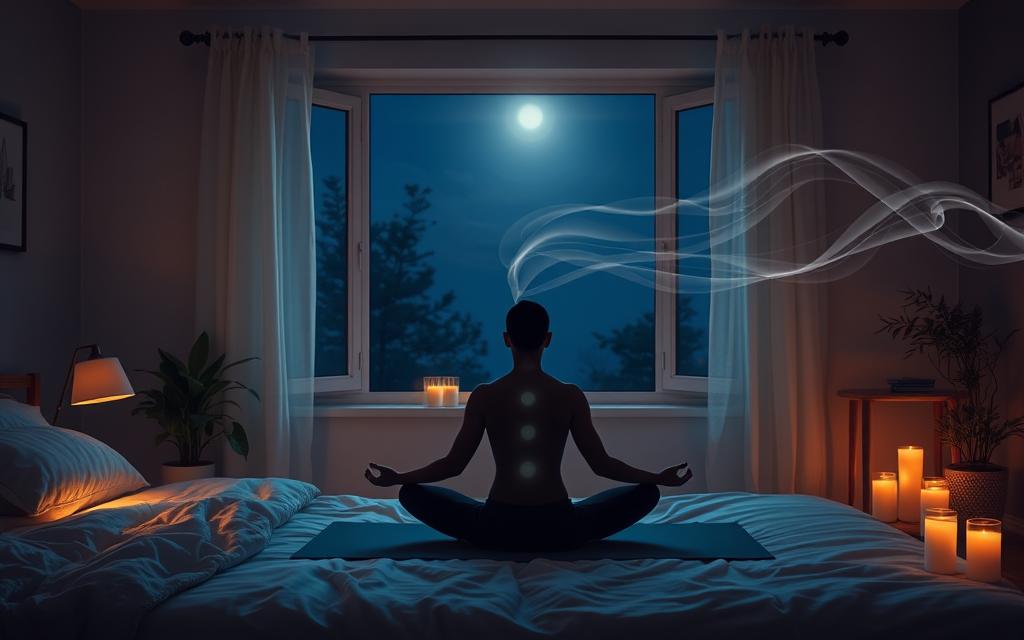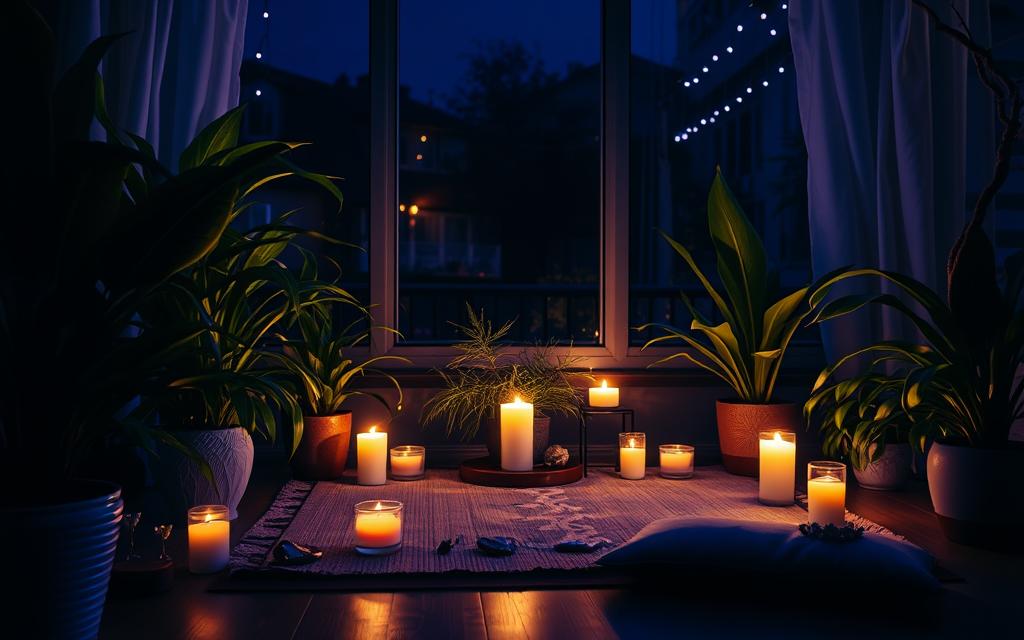Can a simple evening ritual unlock the secret to better sleep and overall well-being? Discover the transformative power of nighttime meditation. It can help you achieve the rest and relaxation your body craves. Explore the science-backed benefits and practical techniques for a more peaceful slumber and a calmer, more centered state of mind.
Understanding the Essence of Sleep Meditation
Sleep meditation is a powerful practice that focuses on being present. It’s backed by science and helps improve sleep, reduce stress, and boost well-being. It teaches us to relax and focus on the moment, letting go of worries.
The Science Behind Sleep Meditation
Many studies show sleep meditation’s benefits. Mindfulness meditation has been shown to improve sleep in people with sleep issues. Adding Cognitive Behavioral Therapy (CBT) to mindfulness makes sleep even better than CBT alone.
Core Principles of Meditative Practice
- Focused Attention: Sleep meditation teaches us to focus on our breath or body, leading to deep relaxation.
- Non-Judgmental Awareness: We learn to watch our thoughts without judgment, helping us calm down.
- Relaxation: It helps us release tension, bringing peace and well-being.
Benefits for Mind and Body
Regular sleep meditation brings many benefits. It helps us fall asleep faster, feel less anxious, and stay emotionally balanced. It also improves physical health, like lowering blood pressure and boosting the immune system.
“Meditation helps regulate the autonomic nervous system, aiding in reducing awakenings during sleep.”
By combining meditation science, sleep quality, stress reduction, and mental clarity, sleep meditation offers a complete way to enhance well-being and ensure a good night’s sleep.

The Connection Between Meditation and Quality Sleep
Meditation greatly improves sleep quality. Studies show that mindfulness and meditation can cut down on sleep disruptions. This leads to better sleep.
Mindfulness and meditation help you sleep longer by reducing nighttime disturbances. This allows your body and mind to fully rest. People often say they sleep better after starting these practices.
These practices also make it easier to fall asleep. They help those who have trouble sleeping at night. Studies show changes in the brain that help with sleep.
Regular mindfulness or meditation can greatly improve sleep. Guided meditations for sleep help you relax before bed. A calm sleep environment, like good lighting and comfy bedding, also helps.
“Mindfulness and meditation can reduce the time it takes to fall asleep, known as sleep latency, helping individuals who struggle with delays in falling asleep at night.”
Older adults see big benefits from meditation for sleep. A study showed they slept better after mindfulness practices. Their sleep quality improved a lot.
Adding mindfulness and meditation to your sleep routine can make you feel more rested. Try different methods to find what works for you. Meditation can greatly improve your sleep and overall health.
Essential Breathing Techniques for Better Sleep
Getting good sleep is key to feeling well. Breathing techniques help a lot. They reduce stress and make you relax, leading to better sleep.
Box Breathing Method
The box breathing method calms your mind and body. It’s like square breathing. You breathe in for 4 seconds, hold for 4, breathe out for 4, and hold again for 4. This pattern helps you focus and relax.
Conscious Breathing Exercises
Conscious breathing focuses on your breath. It helps you calm down. Diaphragmatic breathing, or belly breathing, is great. It makes you breathe deeply and relaxes you for sleep.
Rhythmic Breathing Patterns
Using rhythmic breathing can help you sleep better. Techniques like 4-7-8 breathing and Bhramari Pranayama (humming bee breath) calm you down. They make you focus and relax.
Practicing these breathing exercises, relaxation techniques, and stress reduction can change your sleep. Adding them to your bedtime routine brings peace and restful sleep.

“Breathing is the foundation of our existence. It is the first thing we do when we are born and the last thing we do when we die.”
Visualization Meditation: Creating Your Peaceful Sanctuary
Visualization is a strong tool in sleep meditation. It uses guided imagery and calming colors to shape the mind. This method creates a mental space that feels safe, calm, and peaceful. People often imagine a special place that feels right to them.
This meditation lets you dive deep into your mind. It helps you let go of worries and stress. By focusing on things like the sound of a stream or the smell of flowers, you get ready for sleep.
“Visualization meditation has been scientifically proven to reduce stress levels and promote deep relaxation, making it a valuable tool for improving sleep quality.”
To start your sanctuary meditation, pick a quiet spot where you can relax. Breathe deeply and let your mind explore a peaceful place. It might be a cozy cabin, a quiet beach, or a hidden garden. Use all your senses to make it real.
- Imagine the sights, sounds, and smells around you.
- Picture the textures of things you touch.
- Feel the sun’s warmth or a soft breeze on your skin.
By cultivating this peaceful mental landscape, you find calm and inner peace. This helps you sleep better and feel better overall. Regular practice can also boost your emotional strength and connect you with yourself.

Body Scan and Progressive Muscle Relaxation
Looking for deeper muscle relaxation and better body awareness? Try combining body scan meditation with progressive muscle relaxation (PMR). This method involves focusing on each body part, noticing any feelings, and then tensing and releasing muscles to ease tension.
Step-by-Step Body Scanning
The body scan meditation starts with focusing on the breath. Then, it moves to different body areas. This increases body awareness and spots muscle tension.
It’s suggested to focus on muscle groups one by one. Start with the hands, then move to the forearms, upper arms, and so on. Include the forehead, eyes, cheeks, mouth, jaw, neck, shoulders, chest, stomach, back, hips, buttocks, thighs, calves, and feet.
Muscle Tension Release Techniques
- In the progressive muscle relaxation part, tense each muscle group for about 5 seconds before releasing.
- This method highlights the difference between tense and relaxed states, making the experience more effective.
- It’s important to skip steps that might cause pain or discomfort.
Practicing this technique regularly can greatly reduce physical tension and help you sleep better. It improves body awareness and releases muscle tension. This leads to deep relaxation and better overall health.

“The body scan is a powerful tool for cultivating body awareness and releasing muscle tension. By systematically focusing on each part of the body, we can identify areas of tightness and intentionally let go of stress and strain.”
Nighttime Meditation: A Path to Deep Relaxation
Exploring evening relaxation through meditation at night can change your life. As the day ends, meditation connects you to the restful sleep ahead.
Meditation before bed calms your mind and relaxes your body. Gentle stretches, mindful breathing, or short meditations tell your body it’s time to sleep. This helps you get ready for a good night’s rest.
“Nighttime meditation is a transformative practice that helps us transition from the hustle and bustle of the day into a state of deep relaxation and rejuvenation.”
The evening relaxation process makes a peaceful transition to rest. It helps your mind and body relax deeply. This bedtime routine improves your sleep quality, making you feel refreshed and ready for the next day.

Choose a brief body scan, gentle yoga, or quiet contemplation for sleep preparation. Nighttime meditation is a powerful tool for better sleep and well-being.
Incorporating Mindfulness into Your Evening Routine
As the sun sets, mindfulness can help you relax into a good night’s sleep. It lets you focus on the present, leaving the day’s stress behind. This way, your mind and body get ready for a better rest.
Present Moment Awareness
Mindfulness in the evening means paying full attention to what’s happening now. It helps you stop worrying and find calm. By focusing inward, you prepare your mind for sleep.
Mindful Evening Practices
- Try mindful eating, enjoying your meal’s flavors and textures fully.
- Do a gentle yoga or stretch, feeling your body’s sensations.
- Take time for journaling or thinking about what you’re grateful for, with kindness.
These evening rituals can change your mind’s focus. They help you move away from negative thoughts, making your mind ready for deep sleep.
“Incorporating mindfulness into your evening routine can be a powerful tool for improving sleep quality and overall well-being.”

By living mindfully, focusing on the evening, and reducing stress, you can get better sleep. This leads to a more balanced and fulfilling day.
Creating the Perfect Environment for Meditation
Creating the right space for meditation is key for a good sleep meditation practice. You need a calm, quiet area that helps you relax and focus. By setting up your meditation space, sleep environment, and relaxation setting just right, you can get the most out of your meditation.
First, make sure your bedroom is tidy and not used for work. Keep it cool, use fresh bed sheets, and wear comfy sleep clothes. Adding a $34.99 Brayton 7lbs Salt Lamp can make the atmosphere calm. Soft lights or $49.99 Round Medallion Floor Cushion candles can also help create a peaceful meditation space.
Your sleep environment should be quiet and free from distractions. A $78 Brass Singing Bowl can provide a soothing sound for your meditation. Adding $24.99 Crystal Set or natural elements can also help create a grounding and relaxing setting.
“Research indicates that meditation helps individuals work through emotional blocks, discover new aspects of their personality, and achieve acceptance and serenity.”
In the Western world, meditation is becoming more popular. But, having the right space is important for effective sleep meditation. By setting up a mindful meditation space, you can unlock the full benefits of your practice. This can lead to deeper relaxation and well-being.

Remember, your meditation space, sleep environment, and relaxation setting are personal. You might need to try different things to find what works best for you. Finding your perfect meditation space can be as rewarding as the meditation itself.
Loving-Kindness and Gratitude Practices for Evening Peace
As the sun sets, focusing on kindness and gratitude can lead to peace and sleep. Compassion meditation and gratitude exercises help keep a positive outlook. They keep worries and negativity away.
Cultivating Compassion
Loving-kindness meditation is a simple yet powerful practice for bedtime. Begin by wishing yourself happiness, health, and peace. Then, wish the same for those you care about, even strangers.
Research shows that regular compassion meditation boosts emotional well-being and sleep.
Gratitude Exercises
Gratitude practices add to compassion meditation by making you thankful for life’s gifts. Before bed, think about what you’re thankful for. It could be a good meal, a friend’s kindness, or nature’s beauty.
Studies show that 10-20 minutes of gratitude exercises can improve sleep and reduce stress.
By practicing compassion and gratitude at night, you can create a positive mindset. This helps you sleep better. Try these powerful techniques for a peaceful evening.
“The practice of gratitude shifts our focus from what our lives lack to the abundance that is already present.” – Kristi Nelson
Common Challenges in Sleep Meditation Practice
Starting a meditation practice can change your life, but it’s not easy. You might face obstacles when you try sleep meditation. But, with patience and an open mind, you can get past these challenges. This will help you sleep better and feel refreshed.
One big challenge is quieting the mind. When your thoughts run wild, it’s hard to find peace for sleep meditation. Try counting your breath or using guided visualizations to keep your focus.
Physical issues like restlessness or tingling sensations can also get in the way. Make sure you’re comfy and adjust as needed. If it still bothers you, try active meditation like walking to ease the tension.
Keeping up with consistency in meditation can be tough. Busy lives make it hard to find time. Start with a few minutes each night and grow your practice over time.
Meditation gets better with regular practice. Be patient and kind to yourself when facing challenges. Celebrate your wins, no matter how small. With persistence, you’ll find the peace and well-being sleep meditation offers.
The Role of Sound and Music in Meditation
Sound and music are key in meditation, helping with sleep. Soothing sounds and calming melodies make a peaceful space for sleep. They make meditation better and improve sleep quality.
Choosing Appropriate Sound Therapy
For meditation, pick gentle, repetitive sounds or natural noises. Meditation music, sound therapy like singing bowls, and nature sounds are good. The goal is to find calming sounds that help you relax and focus.
Using Guided Meditations
Guided sleep meditations are great for beginners. They have a soothing voice that guides you, keeping your mind and body relaxed. The pace should be slow, helping you breathe deeply and relax.
“Music has a profound effect on the mind and body, and can be a powerful tool for meditation and relaxation.” – Dr. Sarah Ballantyne, author and health expert
Using the right meditation music and sound therapy can make your sleep meditation better. Try different sounds to see what works best for you.
Building a Consistent Meditation Practice
Creating a regular meditation routine is key to its benefits. It’s vital whether you’re new or looking to deepen your practice. A consistent habit is crucial.
Begin by setting aside a specific time each day for meditation. Even a short 5-10 minute session can change your life. As you get used to it, you can make your sessions longer to get more benefits.
- Be patient with yourself as you build this habit. It’s worth the effort for the rewards.
- Keep track of how meditation improves your sleep and well-being. This will keep you motivated.
- Try different meditation practices like mindfulness or guided visualizations. Find what works best for you.
“The essence of habit formation is the daily practice of behaviors that lead to your desired outcome. To build a consistent regular practice, focus on creating a clear, specific routine and environment that supports your meditation sessions.”
Remember, meditation’s benefits grow over time. Stay committed, and you’ll see how it improves your sleep, mental health, and overall well-being.
Combining Sleep Hygiene with Meditation
To get truly restful sleep, mix sleep habits and a steady bedtime routine with meditation. This combo helps improve sleep improvement and boosts well-being.
Start by setting a regular sleep schedule. Try to sleep and wake up at the same time every day. A calming bedtime routine, like gentle stretching or reading, tells your body it’s time to relax. Stay away from screens and exciting activities before bed.
Make your bedroom a sleep haven. It should be cool, dark, and quiet. Use meditation techniques to relax even more. This mix of sleep habits and meditation can deeply improve your sleep quality.
- Establish a consistent sleep schedule
- Develop a calming bedtime routine
- Create a comfortable sleep environment
- Incorporate meditation into your nighttime ritual
This approach to sleep, combining sleep hygiene with meditation, can make your sleep better. By focusing on both sleep habits and mindfulness, you can get the most out of your sleep. This leads to better physical and mental health.
“Combining meditation with a consistent sleep routine can be a game-changer for your overall sleep quality and health.”
Conclusion
Nighttime meditation is a great way to improve sleep quality, lower stress, and boost overall well-being. It helps by using techniques like breathing exercises, visualization, and body scans. These practices help you relax and sleep better.
By doing meditation every night, you can see big changes in how well you sleep. This, along with good sleep habits, can make a huge difference. It leads to better sleep and a happier life.
Meditation is also good for those with sleep disorders and insomnia. It calms the mind and body, helping you relax. It also helps balance the body’s chemicals, making you feel more at peace.
Adding meditation to your evening routine can make your sleep better. It’s all about finding peace and calm before bed. With regular meditation and good sleep habits, you can feel more refreshed and focused every day.
